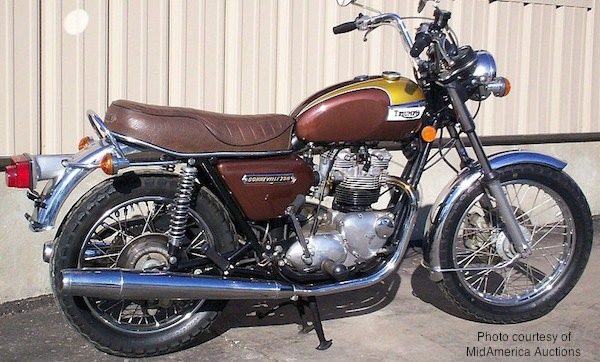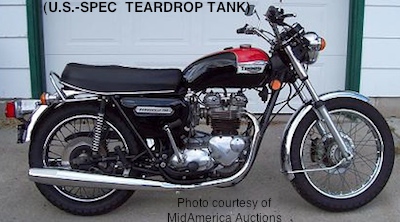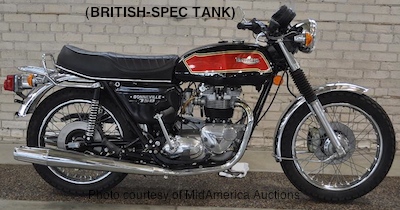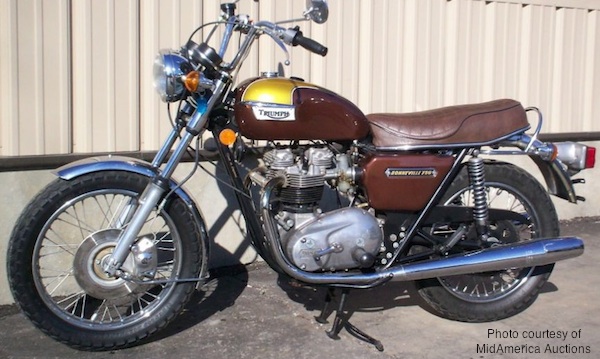ABOVE & BELOW: This 1978 Triumph Bonneville is a T140V, which still has the Delta-style head with splayed intake ports & Amal Concentrics. Later 1978 Bonnevilles were T140E’s, with parallel intake ports & MkII carbs. This color scheme was popular in 1978. A sign of the times: earthtones were in, even for motorcycles seats.

SMOG DOG
The 1978 Triumph Bonneville got a late-year update by Triumph. After several years of little or no change, new U.S. emissions legislations affecting motorcycles was forcing the struggling Meriden Co-op to finally make some changes, although not the changes they would have like to make, to be sure. The 1978 model year started with Engine #HX00100, with the standard T140V 1978 Triumph Bonneville line continuing into 1978 pretty much as they had in 1977. However, on January 1, 1978, production began on its replacement: The T140E. The “E” stood for “Environmental” & meant that the once-mighty fire-breathing Triumph Bonneville was becoming a “smog dog”.


1978 TRIUMPH BONNEVILLE ENGINE
All engine changes seemed to be aimed at meeting every more stringent US emissions guidelines, not performance anymore. The compression ratio was dropped to 7.9:1 in the US to match the UK and export markets, which helped emissions & standardized production.
NEW HEAD FOR THE 1978 TRIUMPH BONNEVILLE
UNF threads were still making their way through the engine & it finally got a composite head gasket in place of the prehistoric copper one. But the biggest change was just north of it. A new cylinder head was cast which now placed the intake ports in parallel paths aiming straight back, ending forever that time-honored Triumph Bonneville tradition of splayed carburetors. The new head also had revised combustion chambers & reworked valve guides & seats.
NEW CARBS
Again, emissions-driven, a new set of carburetors was installed, the 30mm Amal Concentric MkII, suddenly making the old standard Amal Concentric the Mk I. These new carbs were boxy-looking on the outside, but besides the elimination of the tickler valve, very little was different inside. An enrichening lever was located on the left carb that operated both units via a common linkage. The whole point was satisfying the new EPA rules forbidding the escape of any fuel or oil vapor to the outside air. The old round-bodied Amal Concentrics (now called Mk I) vented their float chambers to the atmosphere via the tickler valves, which themselves were messy & had to go.
BETTER VENTING
Further, the crankcase & oil tank venting had to be rearranged, as they were ultimately venting out the back via a hose running along the back fender. The T140E addressed this by venting the oil tank to the rocker box, and the engine, breathging through the primary case, was vented to the airbox.
RUNNING GEAR
Sealed wheel bearings replaced the exposed ones that kept failing, and spokes were upgraded to 9-gauge (apparently spokes had begun braking after the introduction of disk brakes with their increased stopping power). New improved fork seals solved the wear problem & could be retrofitted to earlier Oil-in-Frame twins.
A BROWN MOTORCYCLE SEAT?
The Jubilee seat from 1977 had become the standard Triumph motorcycle seat, sans upholstery in wild colors. It could now be finished in all black or even brown, dependent upon paint colors. The top surface’s upholstered cross-ribbing now extended partway down the sides of the seat. The nose was narrow for use with slimline gas tanks used in the US.
TRIM
US machines retained their chromed fenders front & rear, but UK machines had painted fenders. The sidecovers were new & completely reshaped. They were painted to match the tank on UK bikes, but were black on US versions.
COLORS
Colors for 1978 were more varied than ever before. US bikes could be ordered with 3 different color combos: Tawny Brown over Gold (pictured here); Astral Blue over Gold; and Black over Crimson. UK models got 2 choices: Tawny Brown over Gold; and Aquamarine over Silver.
1978 Triumph Bonneville SPECIFICATIONS
|
T140V Bonneville T140E Bonneville Engine type Displacement Bore & Stroke Compression Carburetors Ignition Engine output Primary drive Primary sprockets Clutch Gearbox Ratios, overall: 1st, bottom 2nd 3rd 4th 5th, top Final drive Final drive sprockets Frame type Suspension, front Suspension, rear Brake, front Brake, rear Tire, front Tire, rear Fuel capacity Wheelbase Seat height Ground clearance Weight |
5-speed 750 Roadster 5-speed 750 “Emissions” Air-cooled OHV vertical twin 744cc / 45.0 ci 76mm X 82mm / 2.99″ X 3.23″ 7.9:1 2- Amal Concentrics MkII, 30mm Battery & coil, Lucas 49 bhp @ 6200 rpm 3/8″ triplex X 84 links Engine 29T X Clutch 58T Multi-plate, wet 5-speed constant-mesh, left-foot shift — 12.25:1 8.63:1 6.58:1 5.59:1 4.7:1 5/5″ X .400″ X 3/8″ chain X 106 links Gearbox 19T X Rear 47T All-welded, oil-bearing large-tube backbone Telescopic fork, hydraulic damping 2-way Swing arm, 2 Girling dampers 10″ disk, 2-piston hydraulic caliper 10″ disk, 2-piston hydraulic caliper 3.25″ X 19″ Dunlop, ribbed 4.00″ X 18″ Dunlop, universal 3 Imp gal (US) / 4 Imp gal (UK & export) 54.5″ / 140.3 cm 32.5″ / 77.5 cm 5″ / 12.7 cm 395 lbs/ 180 kg |


